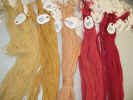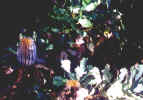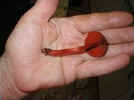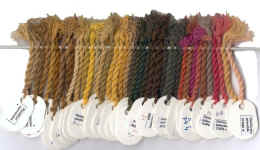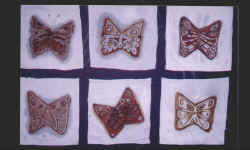|
|
|
These
Australian Symposium pages, on the “Art of Mushroom Dyeing” Website,
are the result of efforts of many individuals – especially the staff of Green Skills who also had provided Bobi Ward, an attendee from
Australia, with the camera, film and equipment to produce the many photos
of the Symposium which you see here. Other attendees who generously
contributed photos are otherwise noted. The project was funded in part by
a grant from the International
Mushroom Dye Institute to
the coordinators of the Symposium who, with Katrina Syme, expressed their desire to invest the
funds into the making of this Web Site. It began as a vehicle to substitute for the “Show and Tell” conclusion part of the Symposium which in the end, we did not have the time to have. At that time each workshop leader would have taken about 10 minutes, to review their workshop and show the work created in it. Synopses by the workshop leaders would have been made available to all of the attendees. So now we have a virtual “Show and Tell” to share with you and many of those workshop synopses. It is a site that will be continually changing and updated as we add new photos and material from the busy workshop leaders and the Symposium staff. I accept all responsibilities for errors or mis-information and would appreciate hearing about any desired changes or corrections ASAP! Lastly, I would like to thank my Web Master, Debby Turner from Web Turner Consulting, for being so incredibly patient with my many and continual revisions! Dorothy Beebee , USA
|
|
|
| INSPIRATION |
| Inspired by Miriam C. Rice’s first little book, "Let’s Try Mushrooms for Color" (Thresh Publications, 1974) fiber artists around the world began adding mushroom dyes to their palettes of natural dyes. In order to share and exchange information and exhibit their new mushroom dyed fibre arts, in 1980, The 1st International Mushroom Dye Exhibit was held in Mendocino, California which coincided with the publication of Miriam’s second book, |
|
|
Mushrooms
for Color (Mad River Press, 1980,).
Every two years since then, textile and fiber artists have gathered from all over the world to exhibit their mushroom dyed works of fiber art, exchange new ideas and teach workshops in dyes, paper-making and pigments made from fungi. |
|
These exhibits and symposia came to be known as the International Fungi and Fibre Federation and are hosted by different groups of textile artists around the world. Over the years, many Australian fibre artists have been attending the symposia, traversing long distances to the Northern Hemisphere, so now they were excited to be able to have a turn to host this event for the first time down in the Southern Hemisphere! |
|
|
|
|
|
||
|
12-18TH JULY, 2003 |
||
|
DENMARK COLLEGE OF AGRICULTURE |
||
|
~ DENMARK ~ WESTERN AUSTRALIA |
||
| by Katrina Syme, Australia |
| This is the first time this biennial international symposium was hosted in the Southern Hemisphere. It provided an excellent opportunity for Australian textile artists to explore a little-used source for natural dyes and hand-made paper. The week included a range of workshops, field trips collecting and identifying fungi in | |||
|
different ecosystems, an exhibition of fungi-dyed textiles and paper made from fungi, presentation of new findings and talks and displays from representative countries. There was also an open discussion on conservation issues surrounding the world’s fungal biodiversity. |
|||
|
FUNGI IN WESTERN AUSTRALIA |
|||
| Western Australia’s vascular plant flora is well documented, with | |||
| 531,000 specimens representing 13,500 species held in the Western Australian Herbarium, Perth. In contrast, however, the fungi (whose numbers are variously estimated to be 7-10 times more than plant numbers) are represented by a mere 7,008 specimens. | |||
|
An example of Australian vast fungal diversity was given during the Inaugural Fungimap Conference, held in Denmark in 2001 last year by Dr. Teresa Lebel (Royal Botanic Gardens, Melbourne), who said: ‘In all of Europe there are approximately 50 genera and 150 species of truffles. |
|||
| In Australia there are 85 genera described with some 300 species. Based on the rate at which we are finding new taxa during recent surveys, the predicted numbers are closer to 110 genera and 900 species’. | |||
| Fungi work conducted by us since 1991 is aimed at answering questions such as: the scale and patterns of distribution; factors determining the limits of distribution; habitat and substrate preference; are exotic species spreading into native forests?; the timing of the appearance of each species and what factors might affect this, and which species are managing to survive in remnant vegetation? | |||
|
|
| Mushroom Dyes go "Down Under"… by Dorothy Beebee | |
| On July 12, 2003, the 11th International Fungi & Fibre Symposium & Exhibition convened for one week, in the charming village of Denmark, in Western Australia. The location for the Symposium in Denmark, W.A. was the very modern and comfortable 4 year old campus of the Western Australia College of Agriculture. This Symposium was organized under the creative leadership of a well-known Australian botanical artist, Katrina Syme, and the able coordination of Jessie MacIver, with the collaboration of the community non-profit organization of Green Skills Inc. | |
| Since only about 15% of the Fungi of Australia have been discovered, classified, and named, the amazing diversity of this Australian venue provided exciting opportunities for many mushroom dyers of the of the Northern climes to work with entirely new fungal species for their dyes. No mushrooms were allowed to be | |
| brought into Australia, and none were allowed to be taken out of the
country without
a special research permit obtained from the Department of Conservation and
Land Management. Swatches of cotton fabric, wool, and silk yarns were used to dye
rich browns, brilliant reds, vivid pinks, vibrant oranges, sunny yellows,
shimmering golds, dark forest greens, and even some sky blue yarns could
be found drying and waving outside the classrooms in the variable sun,
rain and winds of the mild Australian winter.
|
|
| Fiber artists traveled to the 11th Fibre & Fungi Symposium from all across the Australian continent as well as from the countries of Denmark, England, Finland, Norway, Scotland, Sweden, and USA. Many of these fiber artists have been attending these biennial symposia for over 20 years! Certainly one of the highlights of the Symposium was in the reunion with old friends met at previous Symposia!!! | |
|
|
|
|
|
| THE EXHIBIT | |
| EVENING LECTURES & FORUMS | |
| FORAYS | |
| BANQUET (Photos only) | |
|
The circle design
was made using Mushroom paints and Myco-Stix developed by Miriam C. Rice . © by Dorothy Beebee |
|
|
Last updated 10/23/2003 7:40 PM Pacific Time |
|











